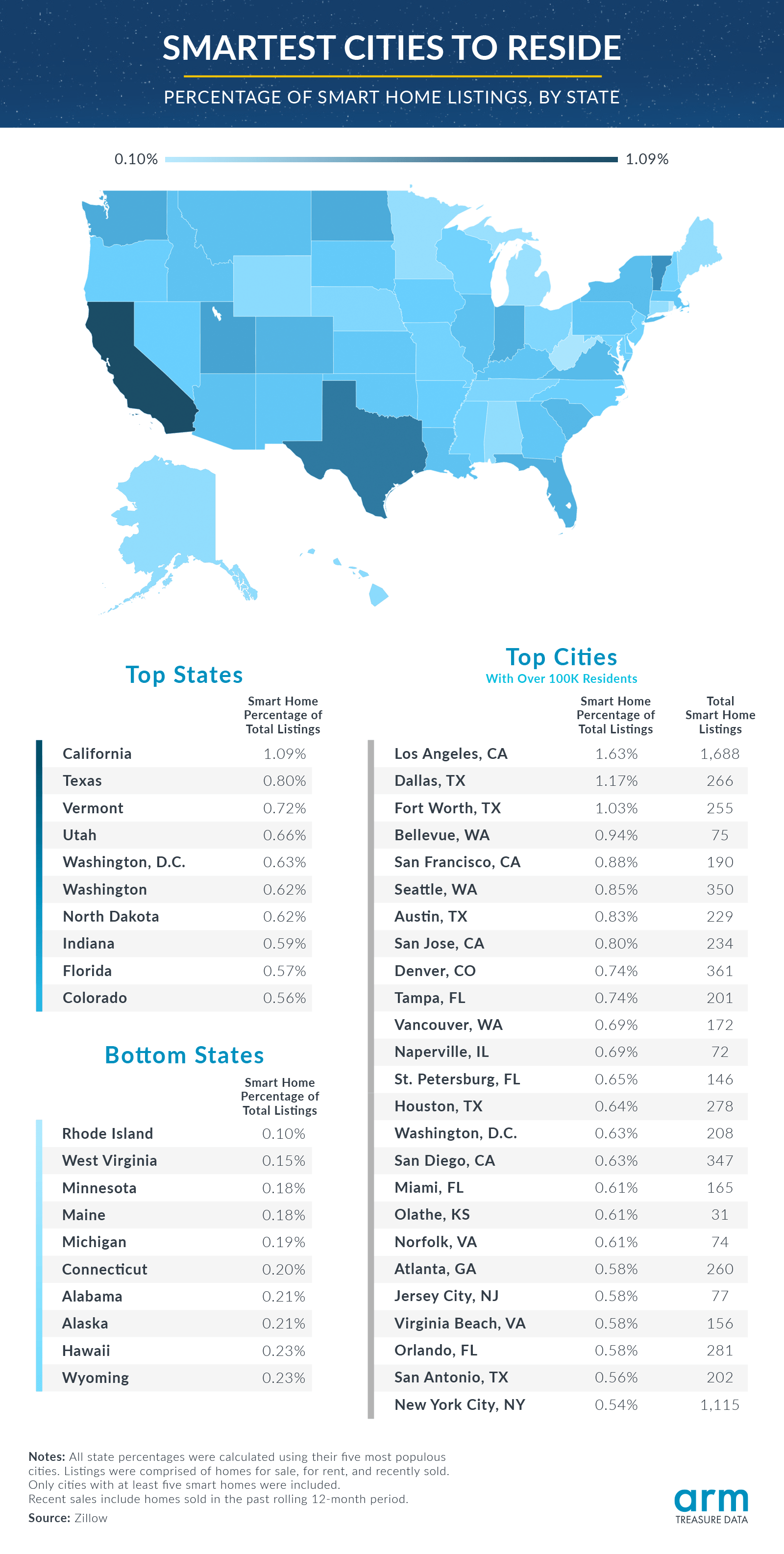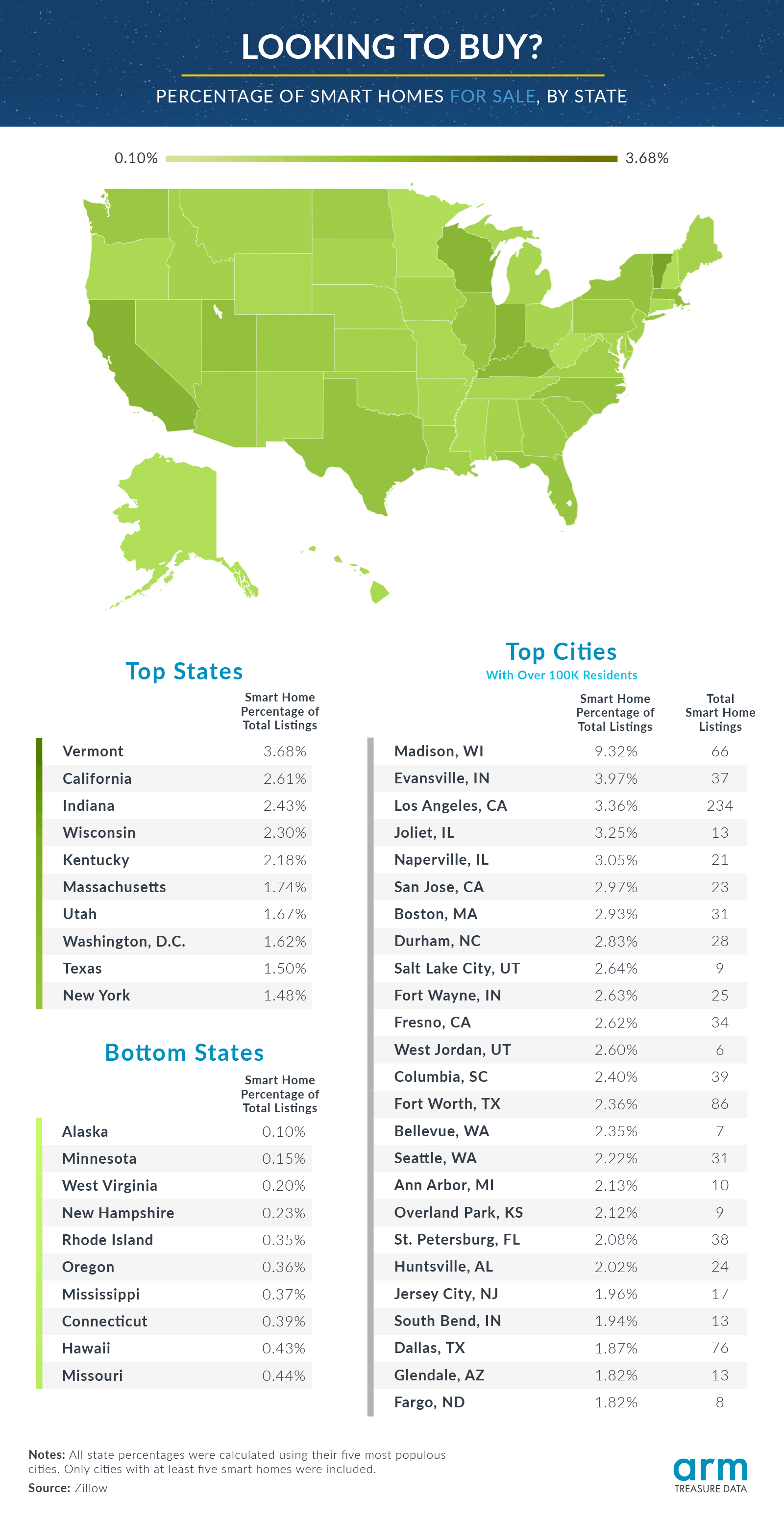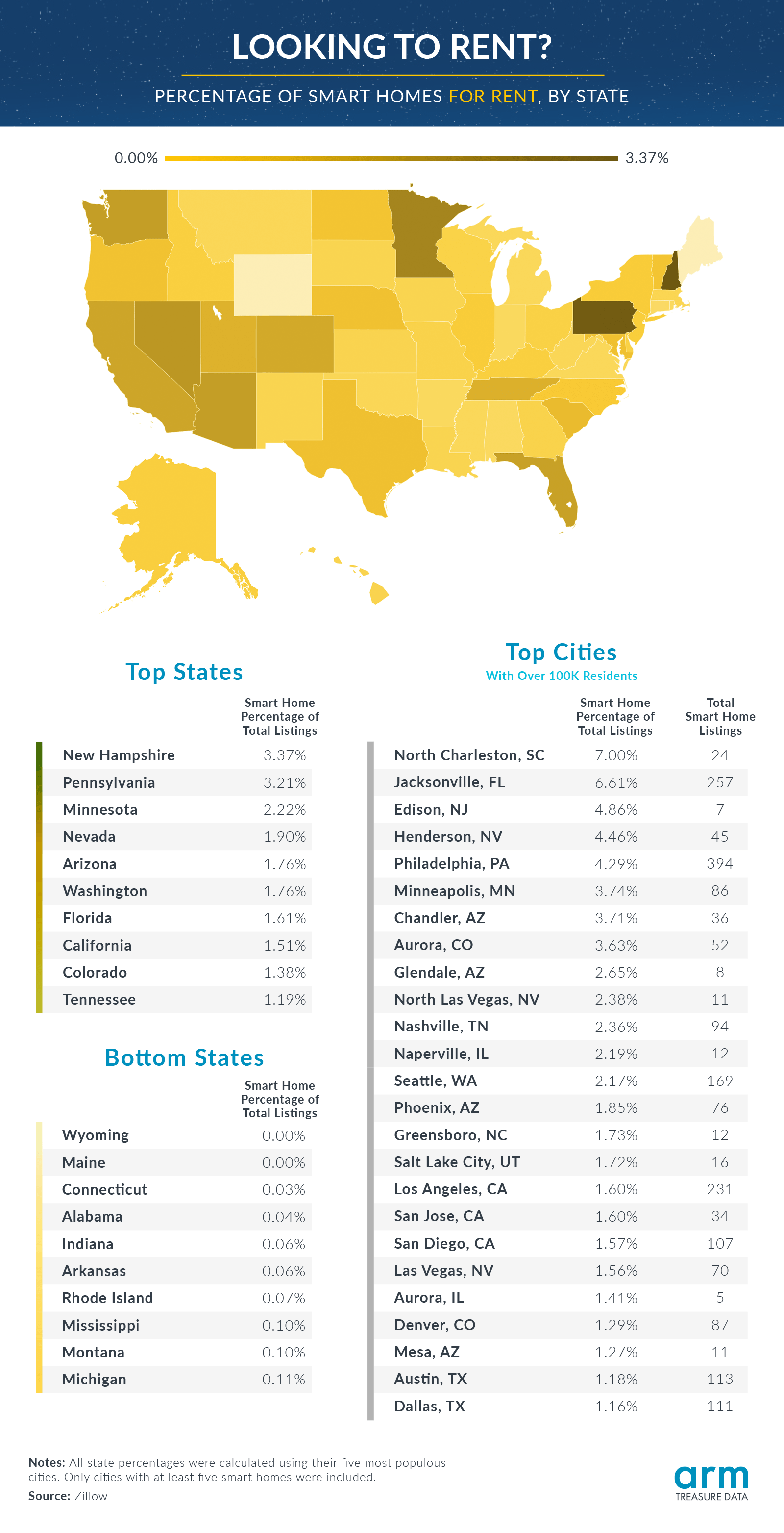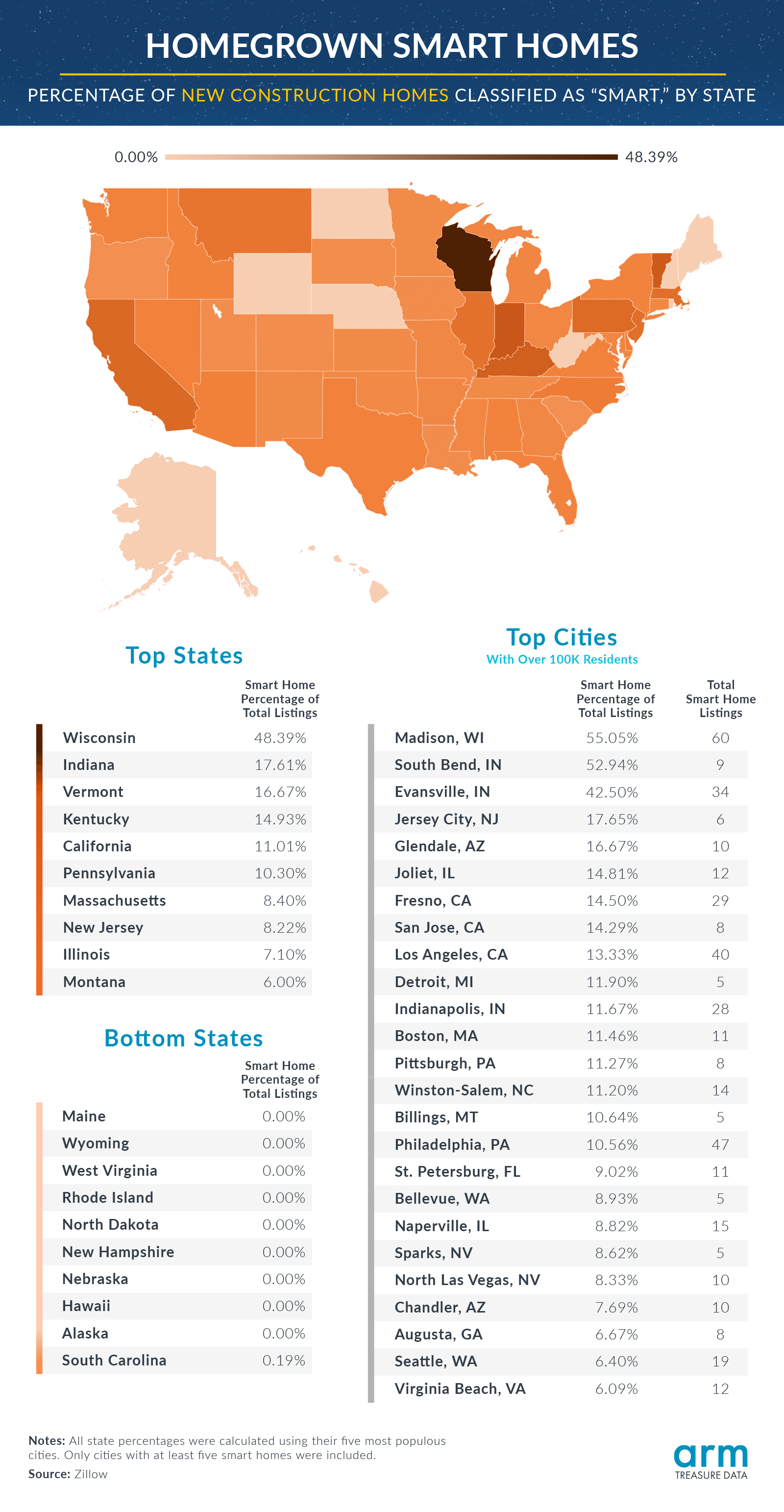Which American Cities Have the Most Smart Homes? The Answer, According to Zillow

Not long ago, artificial intelligence, voice-activated home appliances, and advanced security cameras were the futuristic technology you’d only find in “The Jetsons.” Now, smart home technology is more accessible than ever. As with any technology formerly the stuff of science fiction, smart homes were only made possible—and economical—by virtue of cheap and plentiful computing power. Now, our houses are more connected than ever, installing greater intelligence into our home lives.
As if to dispel any notion that smart homes are anything but an exclusively modern phenomenon, Investopedia defines them as “… a convenient home setup where appliances and devices can be automatically controlled remotely from any internet-connected place in the world using a mobile or other networked device.” If that description is to be believed, then the future is certainly here. But where is here, exactly?
Just how common are “smart homes”—whether that means app-controlled lighting systems, voice-activated thermostats, or refrigerators that keep you updated on what you need to pick up from the store—and which parts of the country are adopting this technology fastest? To find out, we analyzed more than 3.7 million home listings on Zillow. Read on as we break down which states have more smart homes for sale, which cities are adopting this technology the fastest, and where you can rent the most tech-ready homes.
Advanced Home Life
If smart home technology sounds cool but seems out of reach, you might need to start small. While having a smart home does require a certain amount of time and money, there are accessible solutions for people looking to dip their toes without being completely submerged. Smart dimmers and app-controlled lightbulbs are an easy way to experience the convenience of a smart home without having to make a huge investment.

If you’re in the market for a new space already furnished with technology upgrades, you’ll find the most smart home listings in three states: California, Texas, and Vermont. That doesn’t mean every house is going to come preequipped with voice automation, though.
While California ranked as having the highest percentage of smart home listings, only 1% of its total homes for sale, rent, or recently sold had smart home technology. Homes in Los Angeles (1.63% of homes for sale), not San Francisco (0.88%) or San Jose (0.80%), were the most likely to adopt smart home tech in the Golden State.
Ready for an Upgrade
Buying a house equipped with smart home technology is about more than the convenience of voice-controlled lights or thermostats—it can actually be an investment opportunity. In the same way that marble countertops or hardwood floors help increase the overall value of a home, certain smart home upgrades can interest buyers and motivate them to spend more on a home.

Smart homes for sale in Vermont (3.68%), California (2.61%), and Indiana (2.43%) were equipped with a range of such smart technologies. In some cities, the prevalence of smart home technology was even more profound. In Madison, Wisconsin, nearly 1 in 10 homes for sale were equipped with smart home technology, followed by roughly 1 in 25 homes listed in Evansville, Indiana. Silicon Valley is regarded as a hotbed for innovation of all kinds, so it comes as no surprise that San Jose, California, makes an appearance as sixth on the list.
Smart Home Technology for Rent
Smart home technology isn’t limited to prospective homeowners. Depending on where you live, smart home technology has also established a presence in the rental space.

Three states had the highest number of homes available for rent with smart home technology: New Hampshire (3.37%), Pennsylvania (3.21%), and Minnesota (2.22%). While smart home technology may not be as popular as on-site laundry or central air, these states had far more availability for digital thermostats and voice-activated software than either Maine or Wyoming, where no rental homes included smart tech.
Cities with the most tech-related jobs, like San Jose, Seattle, and Austin, may not be the most popular for home technology, either. North Charleston, South Carolina (7%), Jacksonville, Florida (6.61%), and Edison, New Jersey (4.86%) had the highest percentage of smart home technology in available homes for rent.
From the Ground Up
In 2018, the biggest homebuilder in the country, Lennar, announced it would include Amazon’s Alexa (both the Echo Show and Echo Dot) in every new home moving forward. In addition, families who purchased Lennar homes would have an Amazon technician available to help them install and set up the devices. Lennar is betting, one day, smart technology will become as popular as two-car garages.

Homes for sale or rent with smart home technology may only make up a small percentage of the total marketplace, but new construction homes tell a different story. In Wisconsin, nearly half of newly constructed homes included smart home technology, followed by Indiana (17.61%), Vermont (16.67%), and Kentucky (14.93%). Nine states, including Maine, New Hampshire, Rhode Island, and Hawaii, had no new construction homes available with smart home technology.
In certain cities, the adoption rate was even higher. More than half of new construction homes in Madison, Wisconsin, and South Bend, Indiana, were built with smart home technology. Rounding out the list of cities where at least one in every six newly minted residences qualifies as a smart home were Evansville, Indiana, Jersey City, New Jersey, and Glendale, Arizona.
Smart Technology for Every Home
Smart home technology isn’t limited to single-family dwellings. Overall, nearly as many condos (0.52%) adopted smart home technology as single-family homes (0.55%). Condos in Jacksonville, Florida (2.96%), North Charleston, South Carolina (2.78%), and Philadelphia, Pennsylvania (2.46%) were the most likely to have smart home technology. As for single-family residences, smart homes were best represented in Los Angeles, California (2.21%), Dallas, Texas (1.22%), and Madison, Wisconsin (1.21%).

It took decades of evolution in technology as varied as artificial intelligence, voice recognition, and Bluetooth before science fiction would bear fruit: the smart home. Today, new homes are built with this modern connectedness, and the result is the promise of unparalleled security, convenience, and control.
So what’s next? If the modern smart home is the product of technological evolution, the next generation will be one forged in a revolution. Experts anticipate ramped up in-home automation, better artificial intelligence for home security and surveillance, improvements in energy efficiency, and a new emphasis on customizability. And with more new homes being outfitted with smart technology, it’s only a matter of time before smart is the only way to live.
Methodology
Using Zillow, we looked at the total listings for each of the five most populated cities in each U.S. state. Using the search bar, we also typed in “smart home” and counted the total listings with that phrase in the description of the home. Only cities with populations exceeding 100,000 were considered for all “Top Cities” lists. With both the total count of listings and the total count of smart home listings, we calculated the percentage of smart homes in each city. The data in Zillow was already segmented into categories, so we used those categories in our analysis. The findings here are based solely on Zillow listings from January 28, 2019. Any home that was not listed was not taken into consideration. Therefore, our findings may not represent the total number of smart homes in a particular city.
Fair Use Statement
Excited that the future is coming to a city near you? Feel free to share this story and the related graphics on your site for any noncommercial use—we only ask that you include a link back to this page.